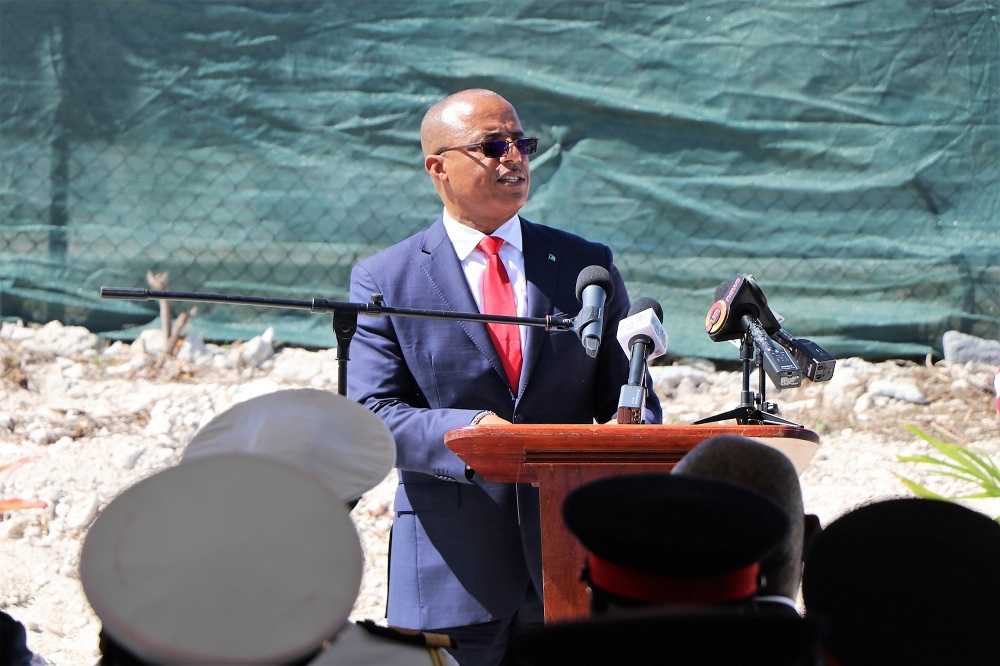#Mathew Town, Inagua, April 24, 2019 – Bahamas – During the The Royal Bahamas Defence Force (RBDF) and United States Northern Command (Northcom) Radar Commissioning Ceremony in Mathew Town, Inagua, on April 17, 2019, Minister of National Security the Hon. Marvin Dames pointed out that, for The Bahamas, increasing regional and international threats meant decentralization of the RBDF for the sustainment of security operations and humanitarian assistance.
“Decentralization of both the operational and administrative components of the Defence Force commenced in three phases in the northern, central and southern Bahamas for effective interdiction at strategic locations,” Minister Dames said. “All three phases are operating concurrently.”
He added: “The
first phase included the acquisition of patrol crafts and dredging of harbours.
The second phase focused on the expansion of existing and the construction of
new bases. Specifically, focus will be given to the expansion of the Inagua
base and the construction of a Ragged Island base, where most of the security
threats originate. The third phase is the acquisition of detection and tracking
technologies.”
Among those present for the Commissioning Ceremony were: Prime Minister the Most Hon. Dr. Hubert Minnis; Deputy Prime Minister and Minister of Finance the Hon. K. Peter Turnquest; Minister of Education the Hon. Jeffrey Lloyd; Minister of Foreign Affairs the Hon. Darren Henfield; Acting Permanent Secretary at the Ministry of National Security Mr. Eugene Poitier; Heads of National Law Enforcement Agencies (HONLEA), including Commissioner of Police Anthony Ferguson, Commander of the Royal Bahamas Defence Force Commodore Tellis Bethel, Commissioner of the Bahamas Department of Correctional Services Charles Muphy, and Comptroller of Customs Dr. Geannine Moss; Senator the Hon. Renard Henfield; MICAL Member of Parliament Miriam Emmanuel; U.S. Embassy Charge d’Affaires Stephanie Bowers; North American Aerospace Defense Command (NORAD) and Northcom Commander General Terrence O’Shaughnessy; RBDF Principal Officer Administration Captain Clyde Sawyer; RBDF Chaplain Rev. Prince Bodie; senior uniformed officers and Government officials; and various stakeholders.
Minister Dames said
that the Government was appreciative to the Government of the United States,
particularly the Department of Defense (DOD), for the donation of a $2.1
million Long-Range Coastal Radar, as an added dimension to the augmentation of
The Bahamas’ multi-layered programme.
“To ensure that the
entire base at Inagua is brought up to standard and to complement this new
technology, contracts were signed totaling $573,000 with three construction
companies on the island for the rebuilding of new units,” he noted. “The new
structures will include a sick bay, detention centre and a mechanical building.
The total proposed projected capitalization and development including the
decentralization programme over the next three budget cycles is expected to
cost approximately $133 million.”
Minister Dames
pointed out that, as it relates to the installation of the Kelvin Coastal
Radar, it fell into the framework for Command, Control, Communications,
Computers, Intelligence, Surveillance and Reconnaissance, commonly referred to
as the C 4 I S R.
“This coastal radar
will serve to enhance the Defence Force’s efficiencies and effectiveness of its
interdiction efforts,” Minister Dames said. “Note that the agency will not
operate in silos but, as necessary, in conjunction with Operation Bahamas,
Turks and Caicos known as OPBAT.
“This longstanding,
multilateral counter-drug operation between the United States, The Bahamas and
Turks and Caicos Islands focuses on narcotics interdiction and other forms of
trans-organized crimes.”
Minister Dames
stated that past experiences had proven that no single asset or equipment could
adequately combat the threats and challenges of the day.
“Hence, today’s installation is part of a broader multi-layered security programme asset, equipment acquisition, and collaboration,” he said. “At this time, let me take this opportunity to thank the U.S. Department of Defense (DOD) for the donation of the Over-The-Horizon Tracking System at the Coral Harbour Base and aboard patrol and aircraft which preceded this donation.”
Minister Dames
pointed out that the technologies, as part of the multi-layered approach, would
also incorporate the use of a multi-agency drone technology programme.
“The Government of
The Bahamas is in the process of finalizing a $17 million contract with a
vendor for the acquisitions of short and medium range drones to assist with
interdiction and surveillance efforts under a multi-agency drone programme,” he
stated. “Under the Heads of National Law Enforcement Agencies (HONLEA), this
programme symbolizes the continued need for local law enforcement institutions
to eliminate silos and make concerted efforts to improve communication and
collaboration. The drone programme will be led by Royal Bahamas Defence Force.”
Minister Dames said
that keeping one’s country safe is challenging for any nation, regardless of
its size; and that the task is mammoth, and it is only expected to become more
complex and multi-faceted.
“Therefore, law
enforcement agencies are expected to become more team oriented, flexible and
resilient in their defences, while being capable to respond to any call for
assistance with speed and agility. In addition, the reliance on technology will
only continue to grow and so will multilateral partnerships,” he said.
Minister Dames
noted that the day was a testament to both, and persons could be rest assured
that the Government of The Bahamas was committed to advancing the security of
the country, through regional partnerships and technological investments as
they were paramount for enhancing security.
“Again, I would
like to thank our regional partner the United States of America, in particular
the Department of Defense, the Department of State, U.S. Northern Command and
NORAD led by General O’Shaughnessy, and the U.S. Embassy in The Bahamas led by
Chargé d’Affaires Ms. Stephanie Bowers, all of whom play a key role in the
security of our region.”
“The world is
watching and today the commissioning of this long-range coastal radar system on
the island of Great Inagua reflects a pivotal milestone in the history of the
country,” Minister Dames added. “I am extremely pleased that we all can be a
part of this momentous historical event.”
By Eric Rose
Release: BIS
Photo Caption: Minister of National Security the Hon. Marvin Dames addresses the Royal Bahamas Defence Force (RBDF) and United States Northern Command (Northcom) Radar Commissioning Ceremony in Matthew Town, Inagua, on April 17, 2019.
(BIS Photo / Eric Rose)


 News1 week ago
News1 week ago
 Bahamas News1 week ago
Bahamas News1 week ago
 Bahamas News6 days ago
Bahamas News6 days ago
 News1 week ago
News1 week ago
 Health6 days ago
Health6 days ago













